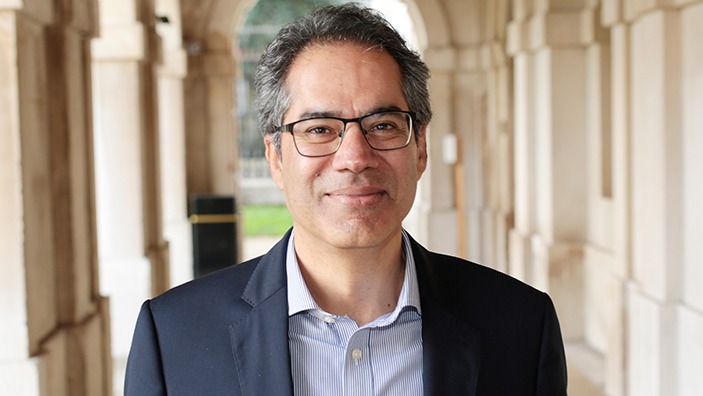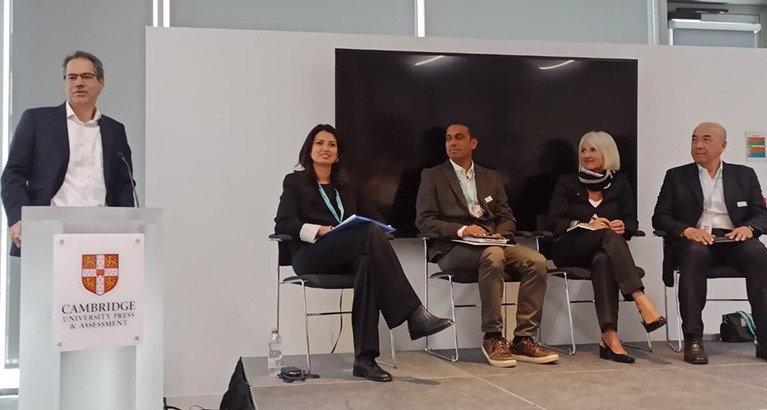Professor of Strategy and Policy
Pro-Vice-Chancellor (University Community and Engagement)
Professorial Fellow of Homerton College
PhD (McGill University)
My research interests include institutional change and stasis, a subject on which I have published many papers. I am also interested in strategy in highly turbulent and disruptive competitive environments, positioning in ecosystems, platform-based strategy, business models, economic development and national competitiveness.
I have served as a consultant to several blue-chip organisations as well as to the World Bank and Asian Development Bank, among others. I’m a member of the Strategy and International Business subject group at Cambridge Judge Business School, and along with my colleagues I actively contribute to both academic and business communities.

Professional experience
Kamal Munir is Pro-Vice-Chancellor (University Community and Engagement) and Professor of Strategy and Policy at the University of Cambridge. In addition, he is a Professorial Fellow of Homerton College, and serves on the syndicates of the Cambridge University Botanic Gardens and the University Library. In the past, he has served as the Founding Academic Director of the Centre for Strategic Philanthropy, Acting Director of the Centre of South Asian Studies, University of Cambridge, and Dean of the Humanities and Social Sciences School at the Lahore University of Management Sciences.
Professor Munir has published several articles on issues ranging from organisational inequality to institutional change in leading organisational and management journals, including the Administrative Science Quarterly, Academy of Management Journal, Journal of Management Studies, Journal of Management, Annals of the Academy of Management, and Organization Studies. At the same time, he has published in economics, history and policy journals. He is frequently invited to give keynotes and plenaries at major conferences and universities. He has won several teaching awards and his courses on strategy in the face of disruption enjoy global popularity.
Professor Munir’s work is cited frequently in the media – including the BBC, CNN, Wall Street Journal, BusinessWeek, Wired, Financial Times, The Guardian, The Tribune and several others. In management, he is frequently invited to consult with, and run strategy off-site workshops for corporations ranging from Airbus Industries to HSBC. In policy circles, he has served as a consultant to the World Bank, Asian Development Bank, and State Bank of Pakistan. He was part of the team that developed the 2010 Industrial Policy of Pakistan.
Professor Munir has served as a Senior Editor of Organization Studies, and as an Associate Editor for the Journal of Management Inquiry. He is the founder of OTREG, an international discussion forum for organisational theorists, and serves on the Editorial Board of Academy of Management Review.
Previous appointments
From 1996 to 2000, Kamal taught at McGill University in Canada.
Publications
- Selected publications
- Journal articles
- Special issues of journals
- Books, monographs, reports and case studies
- Book chapters
- Conference papers
Selected publications
- Munir, K., Ansari, S. and Brown, D. (2021) “From Patañjali to the ‘gospel of sweat’: yoga’s remarkable transformation from a sacred movement into a thriving global market.” Administrative Science Quarterly, 66(3): 854-899 (DOI: 10.1177/0001839221993475)
- Radic, M., Ravasi, D. and Munir, K. (2021) “Privatization: implications of a shift from state to private ownership.” Journal of Management (DOI: 10.1177/0149206320988356) (published online Feb 2021)
- Amis, J.M., Mair, J. and Munir, K. (2020) “The organizational reproduction of inequality.” Academy of Management Annals, 14(1): 195-230 (DOI: 10.5465/annals.2017.0033)
- Syakhroza, M.A., Paolella, L. and Munir, K. (2019) “Holier than thou? Identity buffers and adoption of controversial practices in the Islamic banking category.” Academy of Management Journal, 62(4): 1252-1277 (DOI: 10.5465/amj.2016.1017)
- Amis, J.M., Munir, K.A., Lawrence, T.B., Hirsch, P. and McGahan, A. (2018) “Inequality, institutions and organizations.” Organization Studies, 39(9): 1131-1152 (DOI: 10.1177/0170840618792596)
- Dacin, M.T., Munir, K. and Tracey, P. (2010) “Formal dining at Cambridge colleges: linking ritual performance and institutional maintenance.” Academy of Management Journal, 53(6): 1393-1418
Journal articles
- Nadir, R., Munir, K. and Hussain, S. (2025) “Turning Walled City Lahore into a spectacle: the unintended consequences of heritage conservation.” Third World Quarterly (DOI: 10.1080/01436597.2025.2460651) (published online Feb 2025)
- Munir, K.A. (2021) “Inequality in the time of corona virus.” Journal of Management Studies, 58(2): 607-610 (DOI: 10.1111/joms.12674)
- Munir, K., Ansari, S. and Brown, D. (2021) “From Patañjali to the ‘gospel of sweat’: yoga’s remarkable transformation from a sacred movement into a thriving global market.” Administrative Science Quarterly, 66(3): 854-899 (DOI: 10.1177/0001839221993475)
- Radić, M., Ravasi, D. and Munir, K. (2021) “Privatization: implications of a shift from state to private ownership.” Journal of Management, 47(6): 1596-1629 (DOI: 10.1177/0149206320988356)
- Woodcraft, C. and Munir, K.A. (2021) “How COVID-19 is shifting the North-South philanthropic power dynamic.” Stanford Social Innovation Review, 24 March 2021
- Amis, J.M., Mair, J. and Munir, K. (2020) “The organizational reproduction of inequality.” Academy of Management Annals, 14(1): 195-230 (DOI: 10.5465/annals.2017.0033)
- Munir, K.A. (2020) “Challenging institutional theory’s critical credentials.” Organization Theory, 1(1) (DOI: 10.1177/2631787719887975)
- Syakhroza, M.A., Paolella, L. and Munir, K. (2019) “Holier than thou? Identity buffers and adoption of controversial practices in the Islamic banking category.” Academy of Management Journal, 62(4): 1252-1277 (DOI: 10.5465/amj.2016.1017)
- Amis, J.M., Munir, K.A., Lawrence, T.B., Hirsch, P. and McGahan, A. (2018) “Inequality, institutions and organizations.” Organization Studies, 39(9): 1131-1152 (DOI: 10.1177/0170840618792596)
- Munir, K., Ayaz, M., Levy, D.L. and Willmott, H. (2018) “The role of intermediaries in governance of global production networks: restructuring work relations in Pakistan’s apparel industry.” Human Relations, 71(4): 560-583 (DOI: 10.1177/0018726717722395)
- Munir, K. and Naqvi, N. (2018) “Privatization in the land of believers: the political economy of privatization in Pakistan.” Modern Asian Studies, 51(6): 1695-1726 (DOI: 10.1017/S0026749X16000585)
- Munir, K.A., Naqvi, N. and Usmani, A. (2015) “The abject condition of labor in Pakistan.” International Labor and Working-Class History, 78: 174-183 (DOI: 10.1017/S0147547914000283)
- Herzog, J.O., Munir, K.A. and Kattuman, P. (2013) “The King and I: monarchies and the performance of business groups.” Cambridge Journal of Economics, 37(1): 171-185 (DOI: 10.1093/cje/bes032)
- Munir, K. and Naqvi, N. (2013) “Pakistan’s post-reforms banking sector: a critical evaluation.” Economic and Political Weekly, 48(47): 38-42
- Ansari, S., Munir, K. and Gregg, T. (2012) “Impact at the ‘bottom of the pyramid’: the role of social capital in capability development and community empowerment.” Journal of Management Studies, 49(4): 813-842 (DOI: 10.1111/j.1467-6486.2012.01042.x)
- Munir, K. and Khalid, S. (2012) “Pakistan’s power politics.” Economic and Political Weekly, 47(25): 24-27
- Munir, K.A. and Khalid, S. (2012) “Pakistan’s power crisis: how did we get here?” The Lahore Journal of Economics, 17(SE): 73-82
- Munir, K.A. (2011) “Financial crisis 2008-2009: what does the silence of institutional theorists tell us?” Journal of Management Inquiry, 20(2): 114-117 (DOI: 10.1177/1056492610394739)
- Runde, J., Jones, M., Munir, K. and Nikolychuk, L. (2009) “On technological objects and the adoption of technological product innovations: rules, routines and the transition from analogue photography to digital imaging.”Cambridge Journal of Economics, 33(1): 1-24 (DOI: 10.1093/cje/ben023)
- Ansari, S. and Munir, K. (2008) “How valuable is a piece of the spectrum? Determination of value in external resource acquisition.” Industrial and Corporate Change, 17(2): 301-333 (DOI: 10.1093/icc/dtn004)
- Garud, R. and Munir, K. (2008) “From transaction to transformation costs: the case of Polaroid’s SX-70 camera.” Research Policy, 37(4): 690-705 (DOI: 10.1016/j.respol.2007.12.010)
- Khan, F., Munir, K. and Willmott, H. (2007) “A dark side of institutional entrepreneurship: soccer balls, child labour and postcolonial impoverishment.” Organization Studies, 28(7): 1055-1077 (DOI: 10.1177/0170840607078114)
- Munir, K. (2005) “Act of man.” The Guardian, 11 November 2005
- Munir, K.A. (2005) “The social construction of events: a study of institutional change in the photographic field.” Organization Studies, 26(1): 93-112 (DOI: 10.1177/0170840605049463)
- Munir, K.A. and Phillips, N. (2005) “The birth of the Kodak moment: institutional entrepreneurship and the adoption of new technologies.” Organization Studies, 26(11): 1665-1687 (DOI: 10.1177/0170840605056395)
- Munir, K. (2004) “Saving big blue: case study IBM.” Business Life, May: 16
- Munir, K.A. and Jones, M. (2004) “Discontinuity and after: the social dynamics of technology evolution and dominance.” Organization Studies, 25(4): 561-581 (DOI: 10.1177/0170840604040676)
- Pittaway, L., Robertson, M., Munir, K., Denyer, D. and Neely, A. (2004) “Networking and innovation in the UK: a systematic review of the literature: report prepared for the DTI and ESRC.” International Journal of Management Reviews, 5-6(3-4): 137-168 (DOI: 10.1111/j.1460-8545.2004.00101.x)
- Munir, K. (2003) “Flaws at the core.” Business Life, Oct: 18
- Munir, K.A. (2003) “Competitive dynamics in face of technological discontinuity: a framework for action.” Journal of High Technology Management Research, 14(1): 93-109 (DOI: 10.1016/S1047-8310(03)00006-3)
- Munir, K., with Garud, R. (2003) “Snap decisions.” Business Life, Sep: 18
- Munir, K.A. (2002) “Being different: how normative and cognitive aspects of institutional environments influence technology transfer.” Human Relations, 55(12): 1403-1428 (DOI: 10.1177/001872602128782204)
- Munir, K.A. and Phillips, N. (2002) “The concept of industry and the case of radical technological change.” Journal of High Technology Management Research, 13(2): 279-297 (DOI: 10.1016/S1047-8310(02)00046-9)
- Dougherty, D., Borrelli, L., Munir, K. and O’Sullivan, A. (2000) “Systems of organizational sensemaking for sustained product innovation.” Journal of Engineering and Technology Management, 17(3-4): 321-355 (DOI: 10.1016/S0923-4748(00)00028-X)
Special issues of journals
- Lawrence, T.B., Amis, J.M., Munir, K.A., Hirsch, P. and McGahan, A. (eds.) (2018) “Special issue on inequality, institutions and organizations.” Organization Studies, 39(9)
Books, monographs, reports and case studies
- Woodcraft, C., Munir, K. and Khemka, N.M. (2024) Reimagining philanthropy in the global South: from analysis to action in a post-COVID world. Cambridge: Cambridge University Press.
- Burki, A.A., Munir, K.A., Khan, M.U., Noorani, T., Khan, S.H. and Akhtar, M. (2011) National industrial policy 2011: implementation framework. Islamabad: Ministry of Industries and Production, Government of Pakistan.
- Burki, A.A., Munir, K., Khan, M.A., Khan, U., Faheem, A., Khalid, A. and Hussain, S.T. (2011) Industrial policy, its spatial aspects and cluster development in Pakistan: a report commissioned by the World Bank and the Ministry of Industries and Production. Islamabad: Government of Pakistan
- Pittaway, L., Robertson, M., Munir, K., Denyer, D. and Neely, A. (2004) Networking and innovation in the UK: a systematic review of the literature. London: Advanced Institute of Management Research.
- Birdi, K., Denyer, D., Munir, K., Neely, A. and Prabhu, J. (2003) Post Porter: where does the UK go from here? Summary report from the AIM Management Research Forum June 2003. London: AIM (Advanced Institute of Management).
Book chapters
- Amis, J.M., Munir, K.A. and Mair, J. (2017) “Institutions and economic inequality.” In: Greenwood, R., Oliver, C., Lawrence, T. and Meyer, R. (eds.) The SAGE handbook of organizational institutionalism. Thousand Oaks, CA: Sage, 2nd edition, pp.705-736
- Quinn, Q. and Munir, K. (2017) “Hybrid categories as political devices: the case of impact investing in frontier markets.” In: Durrand, R., Granqvist, N. and Tyllström, A. (eds.) From categories to categorization: studies in sociology, organizations and strategy at the crossroads (Research in the Sociology of Organizations). Bingley: Emerald Group Publishing, pp.113-150 (DOI: 10.1108/S0733-558X20170000051002)
- Ansari, S. and Munir, K. (2010) “Letting users into our world: some organizational implications of user-generated content.” In: Griffiths, D., Phillips, N. and Sewell, G. (eds.): Technology and organization: essays in honour of Joan Woodward. (Research in the Sociology of Organizations Series, vol.29) Bingley: Emerald Group Publishing, pp.79-105
- Munir, K., Ansari, S. and Gregg, T. (2010) “Beyond the hype: taking business strategy to the ‘bottom of the pyramid’.” In Baum, J.A.C. and Lampel, J. (eds.): The globalization of strategy research. (Advances in Strategic Management Series, vol.27) Bingley: Emerald Group Publishing, pp.247-276
- Jones, M., Orlikowski, W. and Munir, K. (2004) “Structuration theory and information.” In Mingers, J. and Willcocks, L. (eds.): Social theory and philosophy for information systems. Chichester: John Wiley & Sons, pp.297-328
- Munir, K.A. and Phillips, N. (2003) “The concept of industry and the case of radical technological change.” In Zedtwitz, M. von, Haour, G., Khalil, T.M. and Lefebvre, L.A. (eds.): Management of technology: growth through business innovation and entrepreneurship: selected papers from the Tenth International Conference on Management of Technology. London: Pergamon, pp.217-237
- Dougherty, D., Borrelli, L., Munir, K. and O’Sullivan, A. (1998) “Interpretive flexibility of an organization’s technology as a dynamic capability.” In Baum, J. (ed.): Advances in strategic management: vol.15: Disciplinary roots of strategic management research. Stamford, Conn.: JAI Press, pp.169-204
- Munir, K. (1998) “Product innovation in a non-Western context: bridging organizations and society.” In Serapio, M. (ed.): Research in international business and international relations: vol.7: international organizational behavior. Greenwich, Conn.: JAI Press, pp.141-161
- O’Sullivan, A., Munir, K. and Dougherty, D. (1998) “Building organizational capabilities for product innovation.” In Kanungo, B. (ed.): Entrepreneurship and innovation: models for development. New Delhi: Sage, pp.265-286
Conference papers
- Jones, M., Munir, K., Orlikowski, W. and Runde, J. (2008) “About time too: online news and changing temporal structures in the newspaper industry.” In Boland, R.J., Limayem, M. and Pentland, B. (eds.): ICIS 2008 Proceedings, 14-17 December, Paris, France.
- Yin, E., Bao, Y., Munir, K. and Merlo, O. (2008) “Global mindedness and strategic orientation of Chinese small and medium sized enterprises in their international expansion efforts.” In: Proceedings of the Global Marketing Conference, Shanghai, China.
- Munir, K., Jones, M., Orlikowski, W., Runde, J., and Nikolychuk, L. (2005) “Of continuities of discontinuous institutional change: evidence from technological transformation in the photographic field.” In: Theorizing process in organizational research: Organization Studies Summer Workshop, 12-13 June 2005, Santorini, Greece.
- Garud, R. and Munir, K.A. (2004) “Socio-technical dynamics underlying radical innovation: the case of Polaroid’s SX-70 camera.” In: Creating actionable knowledge: Academy of Management Annual Meeting, 64th, 6-11 August 2004, New Orleans, LA.
- Garud, R. and Munir, K.A. (2003) “Breaking through and breaking apart: learning from Polaroid’s development of SX-70.” In: Democracy in a knowledge economy: Academy of Management Annual Meeting, Showcase Symposium on Modular Emergence, 1-6 August 2003, Seattle, WA.
- Munir, K.A. and Phillips, N. (2003) “The concept of industry and the case of radical technological change.” In Von Zedtwitz, M., Haour, G., Khali, T.M., Lefebvre, L.A. (eds.): Management of technology: International Conference on Growth through Business Innovation and Entrepreneurship, 10th, selected papers, March 2001, Lausanne, Switzerland. Toronto, Canada: Pergamon Press, pp.217-237
- Dougherty, D., Munir, K. and Subramaniam, M. (2002) “Managing technology flows in practice: a grounded theory of sustained innovation.” In Academy of Management (eds.): Building effective networks: Academy of Management Best Paper Proceedings (62nd), 11-14 August 2002, Denver, Colorado, USA. [Published on CD-ROM], pp. TIM:E1-E6
Awards and honours
- Runner-up, Best Published Paper Award (for “From Patañjali to the ‘gospel of sweat’: yoga’s remarkable transformation from a sacred movement into a thriving global market” with K. Munir and D. Brown), Organization & Management Theory (OMT) Division, Academy of Management, Seattle, USA and Online, 2022
- First Henry Mintzberg Distinguished Alumni Award, bestowed by McGill University for outstanding career accomplishments, 2021
- Cambridge Judge Business School Faculty Award for Research Impact, 2021
- Listed on #ThinklistAmplify, a list of the top influential thinkers in the domain of responsible business, University of Bath, 2020
- Winner, Best PhD Paper Prize (with Maima A. Syakhroza), Strategic Management Society Annual Conference, 2016
- Runners-Up, Best Paper Prize, Strategic Management Society Annual Conference, 2016
- Best International Symposium Award, for Symposium on University-Industry Collaborations, Academy of Management Conference, Chicago, USA, 2009
News and insights
AI and technology
Human brain vs AI: what makes better decisions?
Companies and other organisations are rapidly adopting artificial intelligence to drive strategy and planning. But there’s a key question: does AI actually make better decisions than humans? Academics art Cambridge Judge Business School are using recent research to help answer this question.
A Harvard Business Review article, based on an experiment at Cambridge Judge Business School that simulates the auto industry, finds AI betters human participants in strategic decision-making on market share and profitability.
Faculty news
Improving philanthropy in the Global South
Book outlining shifts in post-pandemic Global South philanthropy is launched with panel discussion at publisher Cambridge University Press and Assessment.
Media coverage
Forbes China | 8 March 2022
Vice-Chancellor of the University of Cambridge – What are the biggest challenges facing CEOs today?
Kamal Munir, Vice-Chancellor of Cambridge Judge Business School, says changing technology has redefined the industry landscape and created new challenges for business leaders across industries when it comes to business.
“Different industries are rapidly integrating into the larger ecosystem. Your competitors aren’t just people who share the same capabilities, provide the same services, or produce the same products as you, they may have a completely different set of capabilities. This makes it difficult for CEOs to navigate because it is asymmetrical competition.” Kamal says.
Forbes | 28 February 2022
Today’s biggest challenges for CEOs according to Cambridge Pro Vice Chancellor Kamal Munir
Kamal Munir, Pro-Vice Chancellor at Cambridge Judge Business School, speaks about how the ever-shifting technologies have redefined the industry landscape, creating new contemporary challenges for business leaders across sectors. “The whole concept of industry has become dangerously misleading. Threats that organisations face are not coming from within their industry.” Munir says.
Forbes | 28 July 2021
Newly appointed Cambridge Pro Vice Chancellor Kamal Munir on equity, diversity and inclusion
An interview with Dr Kamal Munir, as he’s preparing for his new role as University of Cambridge Pro-Vice-Chancellor for Community and Engagement.
“The university as an organisation could support everyone rather than a few people,” Dr Munir said. “It could become a more supportive place for everyone, and nurture more talent, rather than just some talent. Try to bring people to the same level where they get access to similar opportunities and make it part of everyone’s university life. I think everyone needs to be doing something to make the university a more equal, better, and more supportive place.”
Cambridge Independent, 30 June 2021
From AI dysfunctions to privatisation debate
Daily Pakistan, 2 May 2021
Pakistan-born professor appointed Pro-VC of Cambridge University
Financial Times, 5 March 2021
Yoga influencers have stretched themselves
City AM, 8 February 2021
We need to ‘Change the Race Ratio’
Financial Times, 14 January 2021
Pakistan’s opposition circles floundering Khan
Third Sector, 15 December 2020
Pandemic has uncovered ‘deep sense of dissatisfaction’ with global philanthropy, report finds
Financial Times, 28 August 2020
Pakistan army muscles in on Belt and Road project
Financial Times, 24 July 2020
The new rules on what you can say in the office
BBC Radio 4, 23 July 2020
The Bottom Line: How to build a racially diverse business
Alliance Magazine, 7 July 2020
Interview: Badr Jafar
Financial Times, 26 June 2020
Pakistan seeks relief from China over Belt and Road
UK Fundraising, 26 June 2020
Centre for Strategic Philanthropy opens at University of Cambridge
Zawya, 24 June 2020
Centre for Strategic Philanthropy established at University of Cambridge dedicated to high-growth markets including the UAE
The National, 24 June 2020
Cambridge University philanthropy school to focus on Middle East, Asia and Africa
Third Sector, 24 June 2020
New Centre for Strategic Philanthropy is launched
Forbes, 3 June 2020
Confronting Racism: Five must-read articles for every business leader
The Conversation, 13 March 2020
Four reasons Netflix should expand into video games
Cambridge Independent, 28 February 2020
From Hollywood ‘logic’ to ‘highly institutionalised myths’ of the workplace
The Conversation, 27 September 2019
Traditional banks are struggling to stave off the fintech revolution
The Independent, 6 September 2019
‘Google has entered the videogaming industry. Its competitors should be scared’
The Conversation, 19 August 2019
Four reasons Huawei’s new Harmony OS won’t solve its problems
Dawn, 24 March 2019
To fix the economy, start with the power sector
The Conversation, 19 December 2018
Pakistan’s privatisation dilemma as it seeks IMF bailout
The Malaysian Reserve, 12 November 2018
The point when Islamic bankers are willing to break the code
Dawn, 11 August 2018
Creating a sovereign wealth fund
BBC Radio 4, 14 June 2018
The Bottom Line




